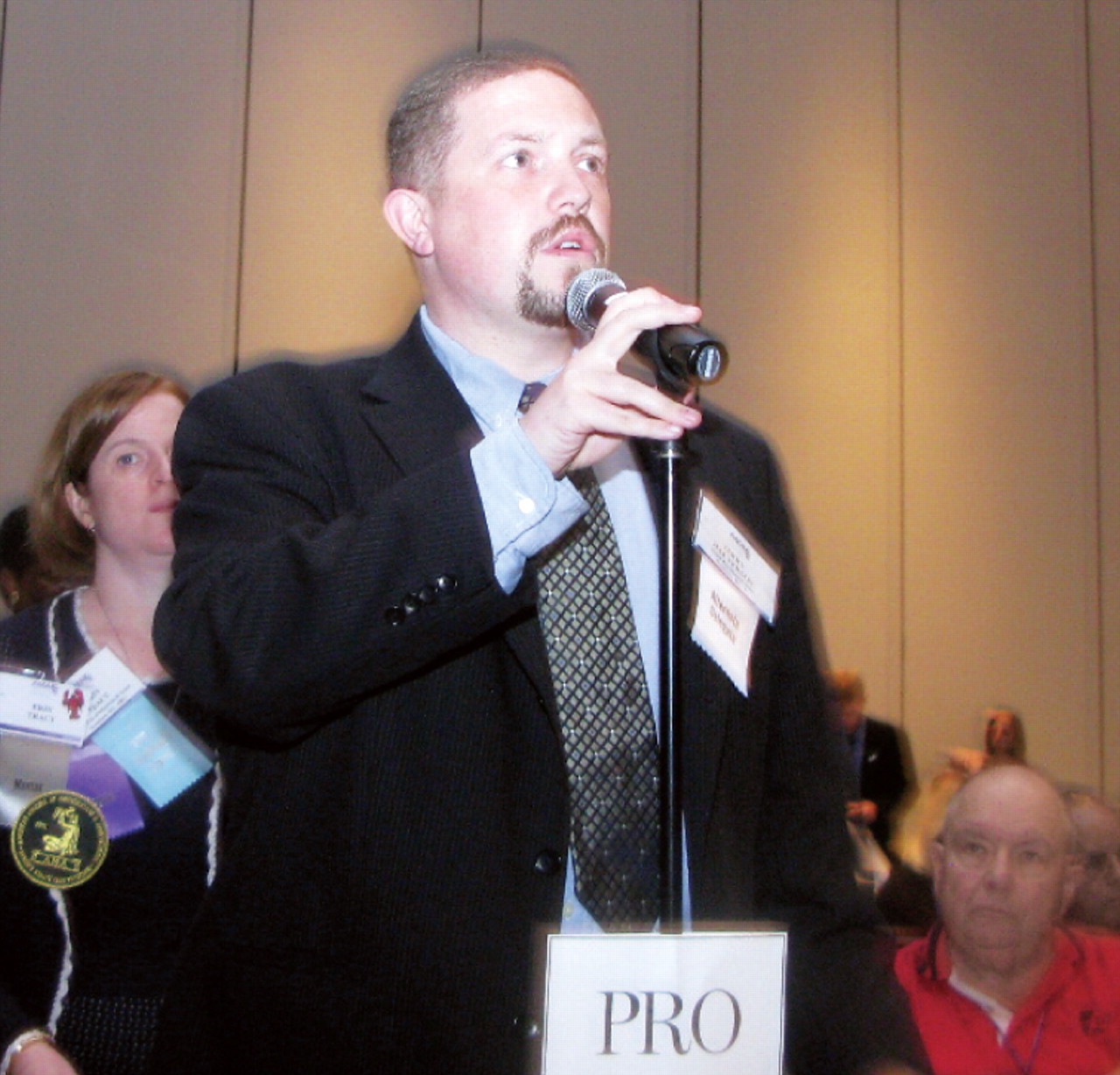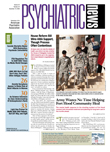The AMA will seek model language for state medical licensure applications that will eliminate discriminatory questions about past mental illness.
A resolution written by the Section Council on Psychiatry requests that the AMA work with the Federation of State Medical Boards and other appropriate stakeholders to develop model language for medical licensure applications that is nondiscriminatory and “does not create barriers to appropriate diagnosis and treatment of psychiatric disorders.”
It was approved with wide support.
“Depression and other psychiatric disorders are as common in physicians as they are in the general population,” psychiatry section council member Jerry Halverson, M.D., testified during reference committee hearings. “There is very good evidence that even the history of psychiatric treatment, not only current psychiatric disability, does lead to more difficulty obtaining licensure in what could only be called a discriminatory practice. The history of a psychiatric disorder does not make you an incompetent physician, but there are states that follow that logic. Our AMA has a policy against such discriminatory questions, yet they are still widely used.”
Fellow section council member Ken Certa, M.D., who is director of student mental health services at Thomas Jefferson University School of Medicine, said fear of such questions on licensure applications definitely has an effect on medical students seeking treatment.
“There is nothing that impairs students more in accessing mental health care than this issue of the licensure application,” he said. “It is absolutely discriminatory. Students worrying about this have led to really horrible outcomes—people leave the profession or much worse. Previous illness really doesn't matter. The only thing that should matter in licensure is current illness.”
Child Abuse Report Approved
In other action of interest to psychiatry, the House of Delegates approved a Council on Science and Public Health (CSPH) report addressing underreporting of child abuse by physicians.
The council's review found that nearly 3 million cases of suspected child abuse are reported to child protective services annually. Although physicians are required to report suspected cases of child abuse, several retrospective studies indicate that physicians do not report all suspected cases of child abuse.
“Physicians are more likely to report a case if they perceive the injuries to be inconsistent with the medical history and if the patient was referred for suspected abuse,” according to the report. “Variables influencing the decision to report include injury type, severity, and apparent family risk factors. Several explanations have been advanced for physicians not reporting suspected abuse, including lack of training and clinical experience and gaps that exist in medical school curricula and residency training. Other barriers to reporting include uncertainty surrounding HIPAA requirements, lack of clinical support services, and poor communication and collaboration among professionals who evaluate, investigate, and adjudicate child maltreatment.”
CSPH and psychiatry section council member Louis Kraus, M.D., who wrote much of the CSPH report, testified in reference committee hearings. “We have 3 million reported cases of child abuse, with very real morbidity and mortality, yet many physicians do not report suspected child abuse,” he said. “The issue is not whether or not they suspect abuse, but that they suspect it and choose not to report it for a variety of reasons.”
The report calls on AMA to do the following:
•.
Recognize that suspected child abuse is being underreported by physicians.
•.
Support development of a comprehensive educational strategy across the continuum of professional development that is designed to improve the detection, reporting, and treatment of child maltreatment. Training should include specific knowledge about child protective services and policies, impact on families, and outcomes of intervention.
•.
Support the concept that physicians, whether emergency department physicians, pediatricians, family practitioners, or child and adolescent psychiatrists, act as advocates for children and, as such, have a responsibility legally and otherwise to protect children when there is a suspicion of abuse.
•.
Recognize the need for studies to better understand physicians' failure to recognize and report suspected child abuse.
•.
Acknowledge that conflicts often exist between physicians and child protective services and that physicians and child protective services should work more collaboratively, including the joint development of didactic programs designed to foster increased interaction and to minimize conflicts or distrust.
•.
Support efforts to develop multidisciplinary centers of excellence and adequately trained clinical response teams to foster the appropriate evaluation, reporting, management, and support of child-abuse victims.
•.
Encourage all state departments of protective services to have a medical director or other liaison who communicates with physicians and other health care providers.
Other Actions Taken
These notable actions were also taken by the House of Delegatges at last month's meeting:
•.
Medical uses of marijuana: Delegates approved a resolution calling for well-controlled studies of marijuana in patients who have serious conditions for which evidence suggests possible efficacy. The resolution further urges that marijuana's status as a federal Schedule I controlled substance be reviewed with the goal of facilitating the conduct of clinical research and development of cannabinoid-based medicines and alternate delivery methods.
Contrary to what was reported by some media outlets, the house was not calling for legalization of medical marijuana. “This should not be viewed as an endorsement of state-based medical cannabis programs, the legalization of marijuana, or that scientific evidence on the therapeutic use of cannabis meets the current standards for a prescription drug product,” the resolution states.
•.
Use of handheld devices while driving: The house approved policy supporting legislation to ban the use of handheld devices while driving.
•.
Support for guidelines regarding online professionalism: New policy approved by the House calls on the AMA to initiate discussions with partner organizations regarding online professionalism—such as the use by physicians of social media like Facebook—to develop a consensus useful for teaching in medical schools and updating the AMA's Code of Medical Ethics.
•.
Proposals to eliminate payment for consultation codes: Delegates voted to oppose all public and private payer efforts to eliminate payments for inpatient and outpatient consultation service codes and to support legislation to overturn recent action by the Centers for Medicare and Medicaid Services (CMS) to eliminate consultation codes. Under the CMS proposal, providers would use existing codes for E/M services, including new and established office visits and initial hospital and initial nursing facility visits. Resulting savings would be redistributed to increase payments for the existing E/M services.

